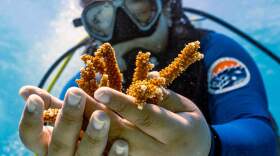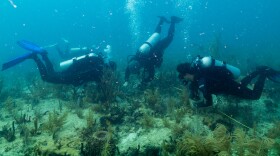-
Scientists warn that a proposed expansion of Port Everglades could cause unprecedented damage to corals in the U.S., including some of the only remaining endangered staghorn corals that survived a record-breaking heat wave.
-
South Florida is home to the only barrier reef in the continental United States. But does it matter to people on land that the corals, like anywhere else in the world, are bleaching?
-
The study to determine what impact a planned port dredge will have on nearby coral confirmed millions of coral, including one of the largest stands of wild staghorn coral left on the reef.
-
The event, part of the recurring Climate Café Series, is titled “The Future of Florida’s Coral Reef: New Approaches for Rebuilding Resilience” and will take place on Wednesday, Oct. 29. The discussion will be moderated by veteran journalist Jenny Staletovich, WLRN's Environment Editor.
-
From Oct. 20 to Oct. 27, just under two dozen car-shaped artificial reefs will be lowered off the coast of South Beach, to create an underwater sculpture park and an artificial reef that organizers called the “first of its kind.”
-
The City of Miami Beach is marking a historic milestone with the first-ever deployment of the REEFLINE, a pioneering underwater sculpture park and hybrid reef designed to blend art, science, and environmental protection.
-
A sharp rise in ocean temperatures this month has scientists keeping a close watch on coral reefs suffering from water persistently warmed by climate change.
-
Elkhorn coral babies, affectionately called “Flonduran” corals by researchers at the Rosenstiel School at the University of Miami, were planted in Biscayne Bay on July 1. This is the first time internationally crossbred corals have ever been planted in wild reefs.
-
In a surprising twist in the ongoing battle against Stony Coral Tissue Loss Disease (SCTLD), new research suggests that rising sea surface temperatures, often seen as a threat to coral, may actually slow down the spread of this highly destructive illness.
-
Scientists from the University of Miami, the Florida Aquarium, and Tela Marine in Honduras are transplanting crossbred coral fragments onto a reef off Miami's coast. The reef was devastated by coral bleaching two years ago. The team is introducing corals from Honduras to increase the reef's resilience to rising ocean temperatures.
-
Researchers at the University of Miami’s Rosenstiel School have found new guidance that will help elkhorn coral survive when replanted in the ocean.
-
The study looked at damaging turbidity, which can harm coral and seagrass, and found levels connected to cruise ships equal to hurricanes.
Play Live Radio
Next Up:
0:00
0:00
Available On Air Stations











